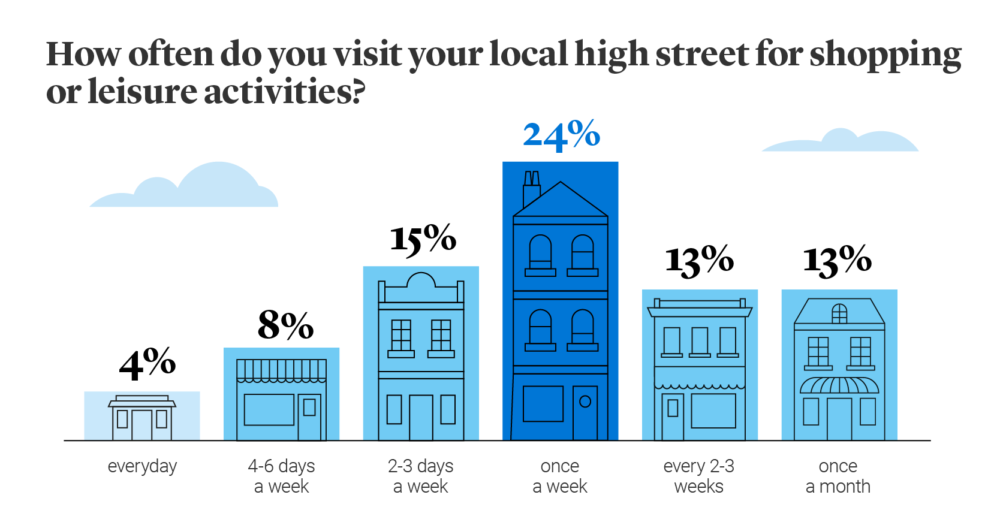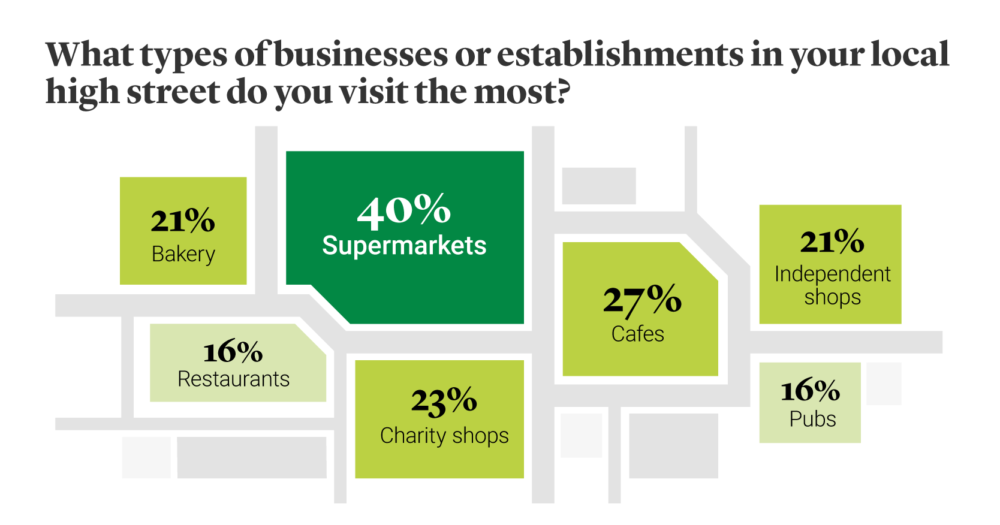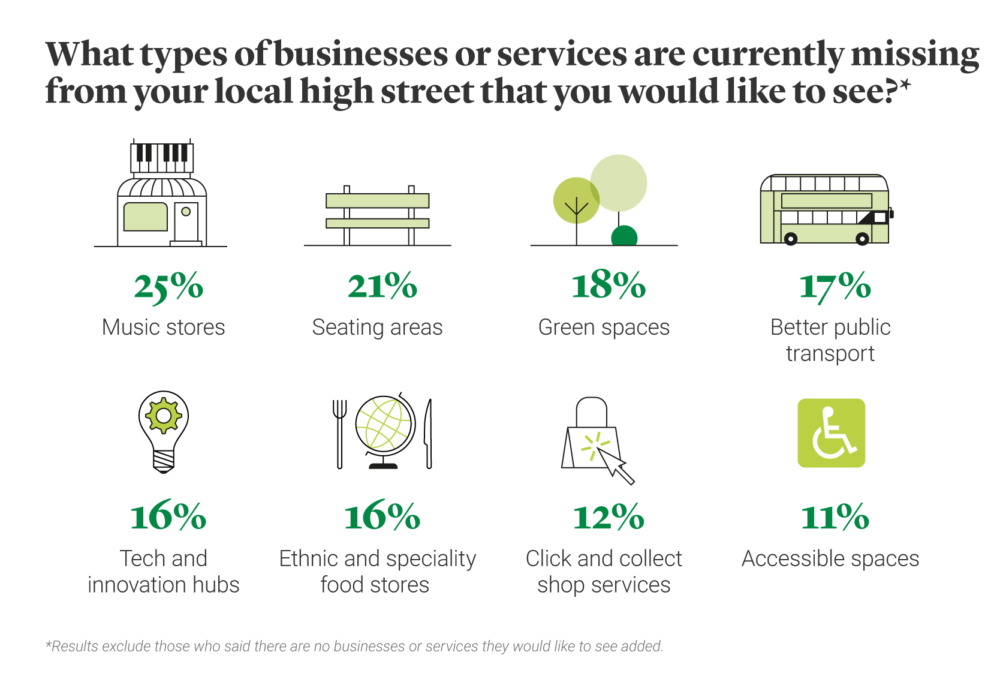High streets are iconic thoroughfares at the heart of many communities and have long held a special place in the hearts of the British public. However, in recent years, they have faced unprecedented challenges, from COVID, the cost-of-living crisis to the rise of online retail.
In light of this, Legal & General conducted a survey of 2,015 UK adults to understand how the British public feels about the past, present, and future of the Great British High Street.

High Streets: the backbone of British communities
When asked about how often Brits visited their local high street, nearly a quarter (24%) of respondents noted they visit once a week. When asked about what businesses or establishments were visited the most, while supermarkets reigned supreme, this wasn’t the case everywhere. In Edinburgh, for example, people were more likely to say they visit cafes (26%) and charity shops (26%) than supermarkets (24%). Similarly, in Bristol, cafes (30%) and charity shops (30%) were popular, with supermarkets third on 29%.
🏆
The 2024 Creative Retail Awards are open for entries.
The Creative Retail Awards are much more than a mere accolade; they represent the pinnacle of achievement in the retail industry. Garnering a nomination or winning one of these awards is a testament to innovation, excellence, and leadership.
www.creativeretailawards.com


Challenges in recent years
The last few years have not proved to be an ‘easy street’ for high streets across the nation. No high street has remained untouched by the impact of the cost of living crisis, a surge in competition from online retailers, and the closures of establishments in the aftermath of the COVID-19 pandemic. The British Retail Consortium’s recent data, published in July 2023, illustrates the severity of these challenges, with the loss of 6,000 storefronts within a span of five years, and high street vacancies have soared to 13.9%.
Legal & General’s survey highlights that the upheaval experienced by high streets has been keenly observed by those polled. Respondents revealed the various changes they’ve witnessed on their local high streets over the past couple of years:
- 45% noted the closure of more shops.
- 37% observed a reduction in the number of retail shops.
- 17% saw the transformation of independent shops into prominent big-brand establishments.
These observations vary regionally. In Wales (54%) and the South West (50%), individuals were particularly likely to report the noticeable closure of shops. Furthermore, respondents over the age of 55, who have fond memories of thriving high streets in their youth, have proven to be the most sensitive to the recent changes, with a majority (56%) acknowledging the impact of shop closures in their local communities.
Evolving dynamics
Adapting to change is an ongoing challenge and it’s evident that high streets are experiencing a continued transformation in response to the digital age, remote work trends, cost of living and other variables. Amidst these changes, a question arises – are the demands and expectations from consumers surrounding high streets also evolving?
The results of the survey strongly suggest that high streets are transitioning from being transactional hubs to experiential destinations, with 36% of respondents agreeing that local businesses are instrumental in shaping the character and identity of their communities.
Furthermore, the rise charity shops, visited by 37% of respondents in the past year, has breathed new life into high streets by offering popular shopping options. Among these visitors, 38% noted they find charity shops cheaper than regular stores, 34% appreciate the unique finds, while 30% say they like giving money to charity shops because it’s a good cause.
The High Street of tomorrow
While reflecting on the high street’s resilience and adaptation in the past and present, Legal & General also set out to uncover what the future holds. When surveying the public about their ideal high street and what could encourage people to visit more frequently, a range of ideas emerged.
35% of respondents indicated that a broader selection of shops would act as a compelling draw, with a more pronounced preference among women (41%) compared to men (29%). A quarter of respondents (25%) agreed that the addition of music stores would be of interest, as would seating areas (21%), green spaces (18%) and better public transport (17%).

More than just bricks and mortar
Although the landscape of the Great British High Street has evolved significantly from its historical roots, with the tales of butchers, bakers, and candlestick-makers, Legal & General’s survey underscores the enduring strength and resilience of the foundations underpinning these beloved community hubs.
In response to a cultural shift in how consumers interact with high streets, where the ‘transactional’ is no longer the priority, but rather the experience, Legal & General has committed to investing in communities via a place-based approach, innovating the shopping centres and retail spaces they own – assisting in shaping them into places for people to gather for experiences and address local needs.
One case of Legal & General’s commitment is The Dolphin Community and Shopping Destination in Poole. In partnership with the NHS, they welcomed the first outpatient assessment clinic in a shopping centre, and the first in Dorset, to help tackle long patient waiting lists. Remarkably, over half of the patients stay and shop within the asset following their medical appointment, thereby bolstering the high street’s role as a community hub.
This isn’t the only Legal & General initiative yielding impressive results. The Kingland development which offered 10 independent Dorset-based businesses two years of rent and business rates exemption, injected vibrancy into the town centre, generating an additional £2.2 million spend across the Dolphin Centre and creating over 30 new jobs in its first year. Furthermore, 2022 saw the launch of Foundry, a suburban co-working space to boost local employment and the levelling up of workspaces.
Denz Ibrahim, Head of Retail and Futuring, Legal & General Investment Management Real Assets says “At Legal & General, we are wholeheartedly dedicated to understanding the sentiments and aspirations of the communities we collaborate with. We recognise that high streets are not just about transactions; they are about creating vibrant, multifaceted community spaces.
“Through embracing a place-based approach, our commitment to fostering high streets as vibrant community hubs goes hand in hand with strategically integrating essential anchors – like healthcare, education, and workspaces to create inclusive and enduring destinations.
“While there is still work to be done to fully realise the ultimate vision for high streets, it’s encouraging to see the survey results confirming Brits’ continued affection and appreciation for them. We will persist in our efforts to enhance and preserve the unique character of the British high street, making it a vibrant and inclusive place for people to gather, connect, and create lasting memories.”















